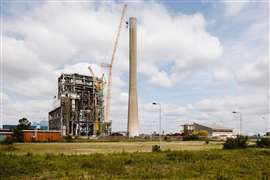$1.35bn plan to build first US small modular reactor scrapped
09 November 2023
 A rendering of a NuScale Power Voygr SMR plant (Image courtesy of NuScale Power)
A rendering of a NuScale Power Voygr SMR plant (Image courtesy of NuScale Power)
NuScale Power has agreed with a power group in Utah, USA, to terminate the company’s small modular reactor project, dealing a blow to US ambitions for a wave of nuclear energy to fight climate change and sending NuScale’s shares down 20%.
In 2020, the Department of Energy approved $1.35 billion over 10 years for the plant, known as the Carbon Free Power Project, subject to congressional appropriations. NuScale has received about $600 million from the department since 2014 to support the design, licensing and siting of the project.
NuScale had planned to develop the six-reactor 462 megawatt project with the Utah Associated Municipal Power Systems (UAMPS) and launch it in 2030, but several towns pulled out of the project as costs rose.
The Utah plant was expected to be the first SMR to win a license from the US Nuclear Regulatory Commission for construction. But NuScale said it appeared unlikely the project will have enough subscription to continue toward deployment.
John Hopkins, NuScale’s president and CEO, said in a release that the company will continue with its other domestic and international customers to bring American small modular reactor (SMR) technology to market and increase the US nuclear manufacturing bases.
NuScale hopes to build SMRs in Romania, Kazakhstan, Poland and Ukraine. Critics have warned that Russia’s takeover of the Zaporizhzhia nuclear plant in Ukraine -- along with repeated shelling near it, power cuts, and perils to the plant’s water cooling resources -- means that reactors, which can release toxic, radioactive materials when disasters strike, should not be built in the region.
NuScale said in January the target price for power from the plant was $89 per megawatt hour, up 53% from the previous estimate of $58 per MWh, raising concerns about customers’ willingness to pay.
An Energy Department spokesperson said it was unfortunate news, but added, “We believe the work accomplished to date on CFPP will be valuable for future nuclear energy projects.
“While not every project is guaranteed to succeed, DOE remains committed to doing everything we can to deploy these technologies to combat the climate crisis and increase access to clean energy,” the spokesperson said.
Existing US nuclear plants, which are larger, provide nearly half of the virtually carbon-free power generated in the US.
SMRs are meant to fit new applications such as replacing shut coal plants and being located in remote communities.
Backers have said the design was safer than today’s reactors, but critics have said SMRs still produce hazardous nuclear waste.
So far, only NuScale’s SMR design has been approved by the NRC.
The public US money for NuScale was awarded through a non-competitive funding vehicle that came before the energy and climate bills passed during the Biden administration.
STAY CONNECTED


Receive the information you need when you need it through our world-leading magazines, newsletters and daily briefings.
CONNECT WITH THE TEAM











